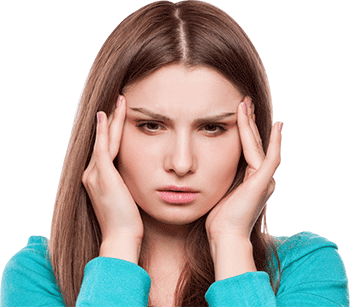Ayurvedic Treatment of Dizziness

About Dizziness
Dizziness is a term which is often used by people to express a series of feelings such as fainting or lightheadedness, woozy, weak or unsteady as well vertigo which is like a false sensation of spinning around or moving or whirling either of themselves or of the surroundings.
Dizziness is very common, can result at any age, more commonly among older adults. It may cause a fear in older adults making them to limit their physical and social activities. It rarely leads to a life threatening condition.
Ayurveda compares dizziness to different conditions such as Murchha, Madh and Sanyaasa (Depending upon the severity).
Causes of Dizziness
Dizziness has so many possible causes like circulation, infection or injury including inner ear disturbance, motion sickness and medication effects etc. Sometimes underlying health condition may be the reason of dizziness.
- Migraine - People who are suffering from migraine may have episodes of vertigo or other types of dizziness even in the absence of severe headache, lasting for minutes to hours. It is many times accompanied by headache as well as light and noise sensitivity.
- Stress or anxiety - anxiety disorders like panic attacks and a fear of leaving home or being in large, open spaces (agoraphobia) may lead to light headedness.
- Labyrinthitis - Infection of inner ear which affects hearing and balance, and can cause severe form of dizziness called vertigo.
- Decrease in level of blood sugar (hypoglycemia) - which is often seen in diabetic people who use insulin.
- Even Postural hypotension where on sudden sitting or standing causes rapid fall in blood pressure, which goes away after lying down, more commonly occurs in old people.
- Over exposure to heat and dehydration may also be one of the cause - which could be due to not drinking enough during exercise, or illness, vomiting, diarrhea or fever.
- Decreased blood flow in the back of the brain, which may be due to blockage of blood vessels leading from heart to the brain.
- Dizziness can be one of side effect of certain medications anti-seizure drugs, antidepressant etc.
- Use of tobacco, alcohol can also cause dizziness.
- Head movements may cause dizziness.
- Flu or cold.
- People with Meniere's disease experience repeated attacks of severe dizziness with a spinning sensation. Each attack lasting for two to three hours or may be up to 24 hours and often accompanied by vomiting. Commonly affect people of 20-60 age and is more common in women than men.
Ayurvedic view of Dizziness
Dizziness (Sanyasa) is usually a symptom that occurs due to hindrance in the blood circulation. Odd blend of food and drink, suppressing the urge of stools and urine, external injuries, and all acts that reduce the attribute of satva (goodness of mind) and excite the vata lead to the problem. These, penetrate into ducts which are the seat of mind and through which the mind communicates with the senses, increase the trait of tamas (darkness) and produce loss of consciousness.
Symptoms of Dizziness
People experiencing dizziness may feel various sensations that involves:
- Feeling of getting faint or lightheadedness.
- False sensation of spinning or whirling.
- Loss of balance and feeling of floating
- Sweating, nausea or vomiting.
- Shortness of breath.
- Headache and Confusion.
- Pain, pressure like feeling in the back, neck, jaw, or upper belly or in one or both shoulders or arms.
- A sudden weakness in the body.
- A fast or irregular heartbeat may be there.
- A person may feel difficulty in walking.
- There can be staggering gait and loss of coordination (ataxia)
- Occurrence of infrequent eye movements, such as flitting of the eyes (Nystagmus).
Risk Factors
- Age: Older adults are more prone to have medical conditions and dizziness may be one of the symptom, especially a sense of imbalance. They're also more likely to take medications that can cause dizziness.
- A past incidences of dizziness may lead to dizziness in the future.
Diet and Lifestyle Advice
Healthy diet and proper lifestyle is the better way to live healthy.
- Keep your body hydrated by drinking at least 8 to 10 glasses of water every day and have other healthy fluids like juices.
- Drink celery juice, it is beneficial in Dizziness.
- Avoid the intake of fried, salty, oily and fast (junk) foods.
- Use of ginger, gooseberry, coriander powder supports to relieve dizziness.
- Have diet rich in vitamins and protein including green leafy vegetables, salad and fruits.
- Stop alcohol and smoking.
- Reduce the intake of coffee and tea. Include green herbal tea instead of these.
- Do slow and long breathing when you feel the dizziness or vertigo.
- Make Yoga and meditation habit of your routine life.
- Have plenty sleep and rest to refresh your body.
- Live happy and cool to stay away from stress.

